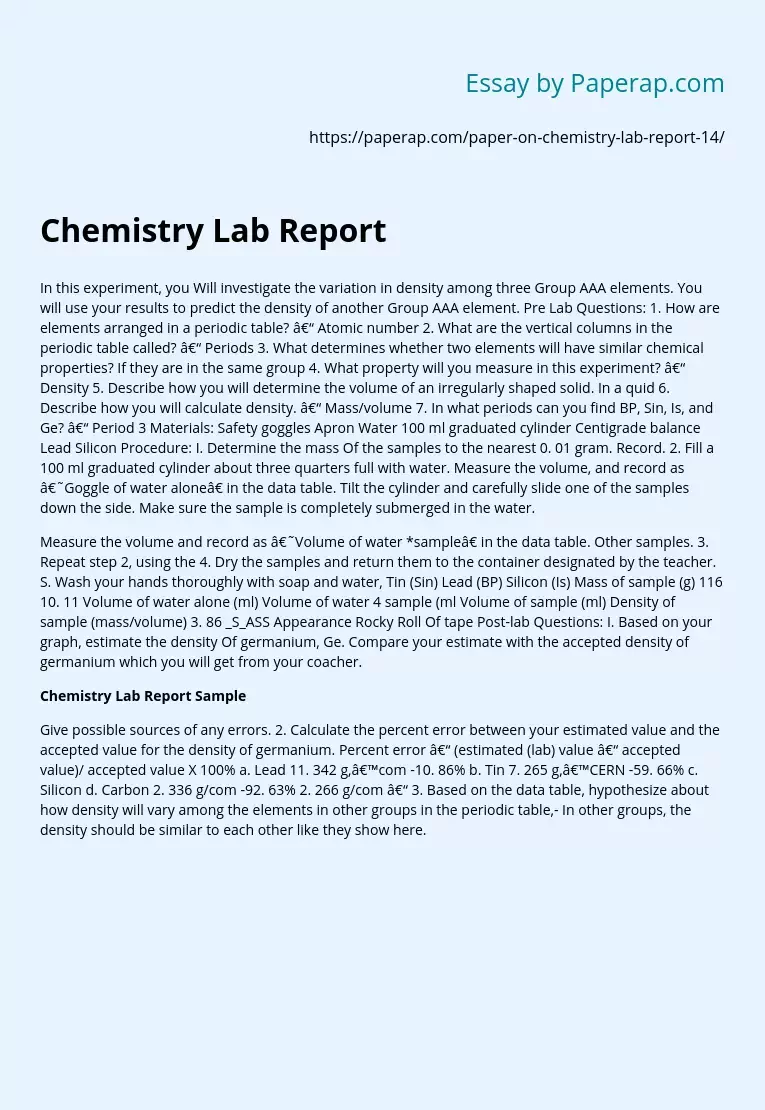Chemistry Lab Report
In this experiment, you Will investigate the variation in density among three Group AAA elements. You will use your results to predict the density of another Group AAA element. Pre Lab Questions: 1. How are elements arranged in a periodic table? – Atomic number 2. What are the vertical columns in the periodic table called? – Periods 3. What determines whether two elements will have similar chemical properties? If they are in the same group 4. What property will you measure in this experiment? – Density 5. Describe how you will determine the volume of an irregularly shaped solid.
In a quid 6. Describe how you will calculate density. – Mass/volume 7. In what periods can you find BP, Sin, Is, and Ge? – Period 3 Materials: Safety goggles Apron Water 100 ml graduated cylinder Centigrade balance Lead Silicon Procedure: I. Determine the mass Of the samples to the nearest 0. 01 gram. Record. 2. Fill a 100 ml graduated cylinder about three quarters full with water. Measure the volume, and record as ‘Goggle of water alone” in the data table.
Tilt the cylinder and carefully slide one of the samples down the side. Make sure the sample is completely submerged in the water.
Measure the volume and record as ‘Volume of water *sample” in the data table. Other samples. 3. Repeat step 2, using the 4. Dry the samples and return them to the container designated by the teacher. S. Wash your hands thoroughly with soap and water, Tin (Sin) Lead (BP) Silicon (Is) Mass of sample (g) 116 10. 11 Volume of water alone (ml) Volume of water 4 sample (ml Volume of sample (ml) Density of sample (mass/volume) 3.
86 _S_ASS Appearance Rocky Roll Of tape Post-lab Questions: I. Based on your graph, estimate the density Of germanium, Ge. Compare your estimate with the accepted density of germanium which you will get from your coacher.
Chemistry Lab Report Sample
Give possible sources of any errors. 2. Calculate the percent error between your estimated value and the accepted value for the density of germanium. Percent error – (estimated (lab) value – accepted value)/ accepted value X 100% a. Lead 11. 342 g,’com -10. 86% b. Tin 7. 265 g,’CERN -59. 66% c. Silicon d. Carbon 2. 336 g/com -92. 63% 2. 266 g/com – 3. Based on the data table, hypothesize about how density will vary among the elements in other groups in the periodic table,- In other groups, the density should be similar to each other like they show here.
Chemistry Lab Report. (2019, Dec 05). Retrieved from https://paperap.com/paper-on-chemistry-lab-report-14/

